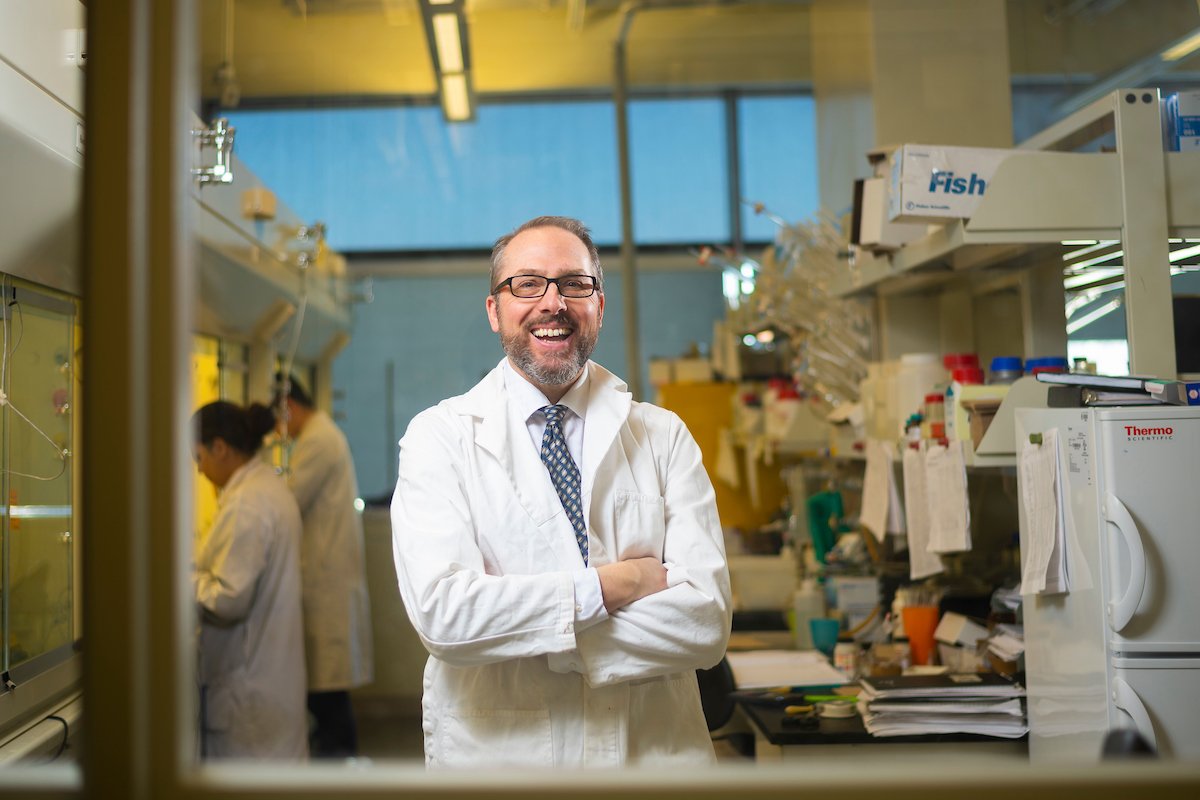
Dennis Hall, professor in the Department of Chemistry and pictured here in his lab, has been awarded the prestigious Killam Research Fellowship. Photo credit: John Ulan
Dennis Hall is no stranger to accolades for his academic excellence. After all, a fellow of the Royal Society of Canada and Canada Research Chair in Boron Chemistry for Catalysis and Drug Discovery, Hall has dedicated decades to pushing the boundaries of chemistry. His perseverance has paid off in spades, improving our understanding of organic chemistry.
And now, he's set to add another notch to his lab coat belt, recognized with the award of the prestigious Killam Research Fellowship from the Canada Council for the Arts. One of only six awarded annually across the country in the fields of arts, science, and engineering, the fellowship will allow Hall to fully immerse himself in the lab in pursuit of creating simpler solutions to complex chemistry, driving drug discovery's future focus.
With his Killam award, Hall will develop more effective and more economical chemical reactions using alcohols as a cheap and non-toxic class of starting materials through the design of direct, catalytic, and waste-free processes using boron-based catalysts activated by other catalysts or with light. The project is aimed at making chemical reactions more effective, meaning simpler and greener chemical reactions useful in the discovery and production of pharmaceutical drugs
"Too many reaction steps in chemistry can create a waste of time and material," said Hall. "The idea with drug discovery and development is to be as economical as possible in as few steps as possible. I am aiming to streamline chemical reactions of alcohols, an important class of compounds that are usually inert, to synthesize new and useful products from two or three steps down to a single step."
Hall added he feels fortunate to supervise a dedicated team of very talented graduate students he believes can successfully tackle this complex problem.
Greener, faster drug discovery
In the shorter term, the new catalytic methods are designed to help circumvent the multi-step processes. In the longer term, they will help provide environmentally responsible methods for the production of commodity chemicals and new medicines to benefit society. Engaging the reactivity of alcohols is an attractive approach, because they are generally non-toxic and available at a low cost, even from natural sources, making their transformation into useful products a sustainable solution to society's needs.
The science behind cutting drug synthesis in half, from a time and material-saving perspective, is anything but simple, but the major potential benefits to society are certainly more than worth the decades of dedication. So what is it that fuels Hall's endless hours in the lab year after year?
"Without the input of organic chemistry, with discoveries like antibiotics and other drugs, our life expectancy would be cut 25 to 30 years, taking us back to where we were at the beginning of the twentieth century," Hall said of his passion for the art of chemical synthesis.
"Investing in organic chemistry is important. It can take decades for fundamental discoveries of new chemical reactions to impact society; a good example is the 2010 Nobel Prize winning class of cross-coupling reactions discovered in the 1970s that are now widely-used in the discovery of life-saving drugs."
Other current research Hall is pursuing to help us live longer healthier lives includes a new molecular compound to prevent aggressive cancer cells from repairing themselves, with profound implications for cancer treatment.
The Canada Council for the Arts awards Killam Research Fellowships to support outstanding scholars to carry out their groundbreaking projects in the humanities, social sciences, natural sciences, health sciences, engineering and interdisciplinary studies within these fields.